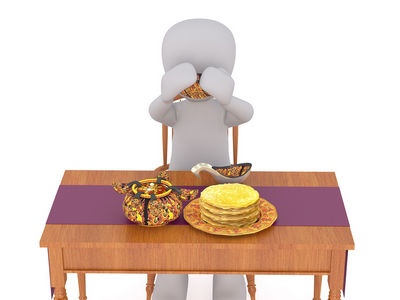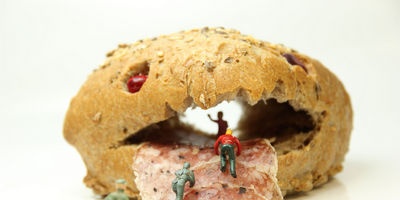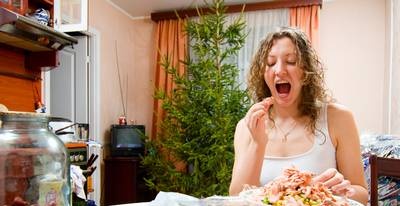|
 A lot of people still strive to "get better", considering this a sign of health and well-being, incorrectly believing that only abundant nutrition, from which a person gains weight, can be considered good. Therefore, for example, they definitely want to "put on weight" while on vacation. At the same time, those who would be wiser to lose weight are often gaining weight. A lot of people still strive to "get better", considering this a sign of health and well-being, incorrectly believing that only abundant nutrition, from which a person gains weight, can be considered good. Therefore, for example, they definitely want to "put on weight" while on vacation. At the same time, those who would be wiser to lose weight are often gaining weight.
Many, however, know that it is necessary to eat in moderation, that overeating is harmful, that the main cause of obesity is overnutrition, in which the amount of food exceeds the needs of the body. They know ... but they do not know how to properly organize their food, because they are not specifically aware of what this moderation should consist of.
Some, for example, incorrectly believe that only obvious overeating, almost gluttony, leads to obesity. In fact, even a small, subtle, but systematic excess of food calories against the true needs of the body will inevitably lead to weight gain over time. Rough calculations show that if you eat food that contains 200 calories more than you need every day (for example, eat an additional piece of bread and butter), then over 7 kg of fat will be deposited in a year.
Others, misunderstanding what overeating is, and wanting to prevent it, reduce the number of meals. This only contributes to a violation of fat metabolism, leads to a decrease in performance, dizziness, headaches and general weakness, but does not prevent obesity at all.
One cannot agree with those who, in an effort to prevent obesity, try to be moderate in various dishes and products, but not in those that are rich in carbohydrates (cereals, sweets, flour and rich foods) and are the main sources of the formation and deposition of fat in the body. ... It is known that even if you significantly reduce the calorie intake of the diet, but leave the same amount of carbohydrate-rich foods in it, the effect of such a diet on weight gain will not be eliminated.
Some people incorrectly believe that the body's need for a particular amount of food is determined and regulated only by appetite, that appetite, they say, will tell how much a person needs to eat. Appetite, however, is not the same as hunger, in which there is a physiological need for food. Appetite can appear in a well-fed person, especially when artificially aroused it (hot snacks, seasonings, spices, delicacies, alcoholic beverages, etc.). Eating every occasional appetite, especially when deliberately kindling it with unusual and special types of food, inevitably leads to overeating.
How much food should a person eat every day?
The answer to this question may not be the same for everyone. The amount of food a person needs depends on the individual characteristics of the organism: gender, age, height, weight, level of metabolic processes, the nature of work, lifestyle (physical activity, sports, walking, etc.) and, finally, climatic and geographical conditions (air temperature, etc.).
 However, the basic principle of the quantitative aspect of nutrition is the following: human nutrition must correspond to energy expenditure. However, the basic principle of the quantitative aspect of nutrition is the following: human nutrition must correspond to energy expenditure.
It is most important in practice to ensure that the "input" does not exceed the "consumption", that is, that the food is not excessive, as this threatens the development of obesity.
There are two ways to achieve at least an approximate correspondence between the caloric value of food and the energy expenditure of the body: control over nutrition and regulation of physical activity.
Along with periodic calculations of nutritional value and calorie intake, it is very important to follow some simple rules of thumb to balance energy consumption with caloric intake.
It is known that a person can get used to eating a lot and a little. Therefore, it is necessary to cultivate a sense of proportion in food. You should never eat your fill, for this entails overeating. The fact is that the feeling of satiety lags behind, as a rule, from the actual satisfaction of the body's need for food. So, for example, when eating irregularly with large intervals between meals, a person, "having seized" a meal, necessarily overeats, since the feeling of satiety appears late, that is, already with a full stomach. As the proverb says: "The eyes would eat, but the stomach does not accept." Therefore, it is useful to develop the habit of getting up from the table with the desire to eat at least a little more and, of course, without feeling heaviness in the stomach. After a few minutes, this feeling will pass and be replaced by a feeling of satisfaction without satiety. In any case, it is better to be undernourished than overeat.
It is equally important to accustom yourself to order in nutrition. Many people like, as they say, to “have a snack” with something tasty. However, casual, casual meals not only disrupt the correct diet, but also deliver the body a certain amount of unaccounted for "hiding" calories, which significantly increase the daily calorie intake. To ensure that the diet is not replenished with such unmeasured, "hiding" calories, you must try not to eat between meals.
To prevent excess nutrition, you should not, as some do, constantly "whet" your appetite with spicy, salty and delicious food, as well as indulge your weaknesses and bad habits in the excessive consumption of your favorite foods and snacks, and especially flour and sweet foods (cookies, pies, confectionery, muffins, cakes, etc.).
The main indicator of the sufficiency or excess of nutrition can be considered body weight
Weight gain can be judged by many signs: by appearance, by the waist (an increase in the width of the waist by 1 cm indicates an increase in weight of about 1 kg), by the thickness of the skin fold (the thickness of this fold should not exceed 2— 3 older - 3-4 cm). However, the best way to determine whether you are over or under nutrition is to weigh yourself regularly.
A healthy person who eats in moderation maintains their weight at a certain level without significant fluctuations. Maintaining a certain normal weight is a kind of indicator of health and proper nutrition. If a normal weight is maintained for a long time, it means that a balance has been established between the body's spending and nutrition. If a person, other things being equal, is losing weight, it means that the food is not enough, if it gets fat, then the food is abundant.
Unfortunately, weight control has not yet become a habit for many. Studies show that the vast majority (over 80%) do not monitor their weight, while some do not weigh themselves for many years. It is necessary to check your weight regularly, at least once every two months: medical scales are available in baths, hospitals, swimming pools and other places.
 To determine the amount of excess weight, you must first set the "normal" weight of a person. To determine the amount of excess weight, you must first set the "normal" weight of a person.
What weight should be considered normal?
Normal weight is considered a weight equal to approximately the difference between the height in centimeters and the figure 100 (that is, equal to the last two figures of height). So, with a height of 160 cm, the weight should be 60 kg. With an increase from 165 to 175 cm, 105 is subtracted, and with an increase from 175 to 185 - 11O. Thus, with a height of 170 cm, the normal weight will be 65 kg, and with an increase of 185 cm - 75 kg.
However, when determining the normal weight by this method, the gender, age, and physique of a person are not taken into account.
Besides voluntary or involuntary overeating, decreased muscle activity plays a large role in unwanted weight gain.So, although some try not to overeat, but with age they usually cease to engage in physical education and sports, lead a sedentary lifestyle. While maintaining eating habits as a result of reducing energy costs, the previous amount of food turns out to be excessive.
There is no doubt that a decrease in muscle activity with the same amount of food intake will affect weight gain. Professor S.M. Leites gives an interesting calculation in this regard: if a person living on the second floor and going outside twice a day moved to the first floor, then, all other things being equal, he would have to gain about 2 kg.
It is necessary to help your body to match the caloric value of nutrition and the energy costs produced not only through moderation in nutrition, but also through gymnastics, sports, physical labor, and tourism.
L. V. Baranovsky
|
 A lot of people still strive to "get better", considering this a sign of health and well-being, incorrectly believing that only abundant nutrition, from which a person gains weight, can be considered good. Therefore, for example, they definitely want to "put on weight" while on vacation. At the same time, those who would be wiser to lose weight are often gaining weight.
A lot of people still strive to "get better", considering this a sign of health and well-being, incorrectly believing that only abundant nutrition, from which a person gains weight, can be considered good. Therefore, for example, they definitely want to "put on weight" while on vacation. At the same time, those who would be wiser to lose weight are often gaining weight. However, the basic principle of the quantitative aspect of nutrition is the following: human nutrition must correspond to energy expenditure.
However, the basic principle of the quantitative aspect of nutrition is the following: human nutrition must correspond to energy expenditure. To determine the amount of excess weight, you must first set the "normal" weight of a person.
To determine the amount of excess weight, you must first set the "normal" weight of a person.









